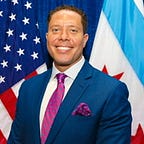One “Color”, Many Shades: We’re Not All the Same
Entering Black History Month, what many people do not realize is that just because we’re “black”, it doesn’t mean we’re all the same. Although I am not a historian, we must begin with a tiny — way too quick highlight that does not truly give justice nor respect to our ancestors — background to set the stage of being “black”.
According to the Smithsonian’s great National Museum of African American History & Culture[1] (NMAAHC), the terms “white” and “slavery” became commonplace in Europe in the 1500s eventually making its way to America and leading to the term “black”, which during the early days of this country and the American Revolution, became synonymous with “slavery”.
Similarly, this was codified in 1787 at the United States Constitutional Convention by the three-fifths compromise in Article 1 of the Constitution which was essentially abolished via the 14th Amendment. Inherently, this classification of people of color continued following the Civil War through Reconstruction leading to numerous pieces of legislation like the “one-drop rule” where if you had one ancestor or “drop” of “black blood” you were considered black. This less-than or hierarchical mentality of whites being superior to blacks was further heightened in Jim Crow and the Civil Rights Movement, resulting in “if you’re not ‘white’ you’re ‘black”. In fact, this idea has persisted and is accepted in modern day society.
That said, although we may be black we all have different stories.
For me personally, my great, great grandfather’s (through my mother’s paternal lineage) family made it to America through the slave trade. His parents were stolen from or bought in West Africa and brought to Jamaica through the middle passage’s slave trade. While in Jamaica, they were enslaved and owned by the Wray Plantation outside of Kingston, taking on their slave owner’s last name, Wray. While on the plantation, my great, great grandfather and his family tended the land’s sugar canes for the production of rum. For fellow rum drinkers, the Wray family is the owner of the brand of rum named Appleton Estates. At some point while a slave, although dark complexion, my great, great grandfather, Ambrose, won favor with his owners by learning to tend their ships and for a reason we do not know, was given his freedom. Following some period of time, Ambrose and his wife birthed my great grandfather, Ancel, and with their freedom soon made their way to America on a ship he was hired to work on.
In my case, we only truly know one line of my mother’s ancestry and not the other. By the grace of God, this part of my family is fortunate to know the steps our ancestors took and obstacles they overcame in order to get to and make a life in America. Similar to my mom’s maternal ancestral lineage who are also black (and Irish), many black Americans do not specifically know how nor when their families made it here other than knowing that they probably came as slaves or as free individuals to the north or generally, after slavery ended.
On the other hand, there are some blacks in America who have made it here through modern day immigration from Africa, the Caribbean, parts of the Middle East, or other parts of the world. Their reasoning for coming range the gambit. For some it’s for a better education or to flee their war torn or impoverished countries to make a better life and opportunity for their families. Regardless of where they’re from, why, how or when they got here, once they’re in America, they are lumped “black”.
Historically, at the helm of others we were deemed “black” as a way to attempt to create an inferiority complex and to delineate class or stature based on the color of our skin, but all it did was strengthen our resolve and pride for being black. It made us learn that things are not always fair and definitely not just. It made us understand that knowledge and education are essential. It made us work harder at what we want to achieve knowing that in some instances we’d have to work twice as hard for an equal opportunity. It made us recognize that our dreams needed to be a bit bigger. In a way, the plan of those evil people of that time back fired.
Although we’re all black, rightfully so all of us are different. We’re from different parts of the world, have varying degrees of education and opportunities, from various socio-economic situations, have different experiences and family dynamics, and have been in America for hundreds of years possibly at the hands of others or hundreds of days on our own volition.
We range the shade spectrum from being very fair-skinned like my mom to as dark as midnight like my stepfather who raised me. Like other races, we have brown, green, hazel eyes, and even some of us have blue eyes like myself. Our features are thick, thin and everything in between. Our hair is curly, straight, thick, coarse, and fine. We are doctors, lawyers, teachers, social workers, retail and hospitality workers, members of the military, union members, work in the trades, IT, and in all other professions and jobs that exist.
For our fellow brothers and sisters not of color, we all may be black, and surely are proud of it, but just like you we all are unique and bring different perspectives to help build our communities, contribute to our economy, serve our country, and to hopefully make life better for those after us.
[1] Full disclosure, due to my time serving as the Chair of the Ohio Commission on African American Males, I was given the opportunity to serve as a charter member of the NMAAHC, which I am.
